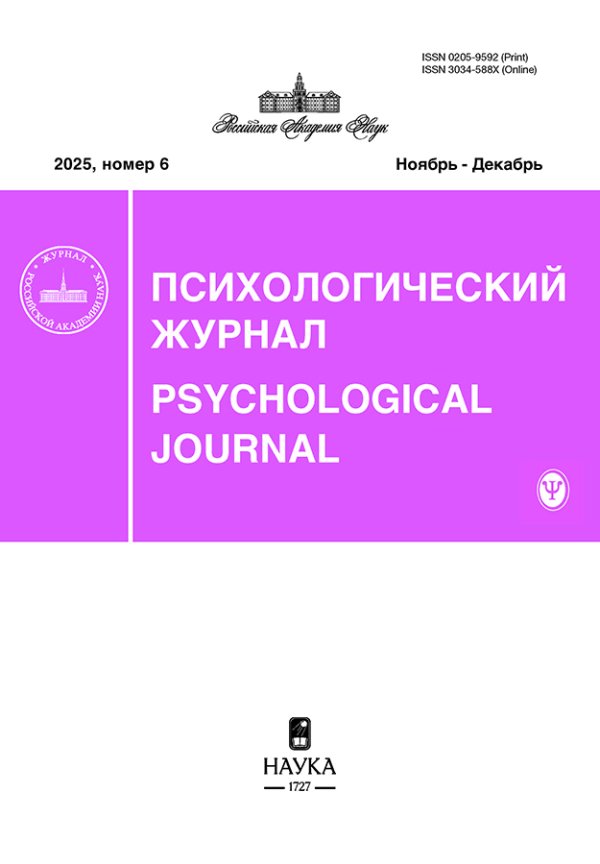Life Goals Diagnosis: Short Version of “Aspirations Index” Questionnaire
- Authors: Gordeeva T.O.1,2, Sychev O.A.3, Egorov V.A.4
-
Affiliations:
- Lomonosov Moscow State University
- National Research University “Higher School of Economics”
- Altai State Humanitarian and Pedagogical University named after V.M. Shukshin
- Non-profit organization “Trust Fund for Future Generations of Sakha (Yakutia)Republic”
- Issue: Vol 44, No 4 (2023)
- Pages: 49-62
- Section: Methodes and procedures
- URL: https://bakhtiniada.ru/0205-9592/article/view/141005
- DOI: https://doi.org/10.31857/S020595920027085-9
- ID: 141005
Cite item
Full Text
Abstract
About the authors
T. O. Gordeeva
Lomonosov Moscow State University; National Research University “Higher School of Economics”Russian Federation, Moscow
O. A. Sychev
Altai State Humanitarian and Pedagogical University named after V.M. ShukshinRussian Federation, Biysk
V. A. Egorov
Non-profit organization “Trust Fund for Future Generations of Sakha (Yakutia)Republic”Russian Federation, Yakutsk
References
- Гижицкий В.В. Учебный обман как стратегия псевдоадаптивного поведения у старшеклассников // Ученые записки Орловского государственного университета. Серия: Гуманитарные и социальные науки. 2014. Т. 58. № 2. C. 293–299.
- Гордеева Т.О., Сычев О.А., Гижицкий В.В., Гавриченкова Т.К. Шкалы внутренней и внешней академической мотивации школьников // Психологическая наука и образование. 2017. Т. 22. № 2. C. 65–74.
- Осин Е.Н. Отчуждение от учебы как предиктор выгорания у студентов вузов: роль характеристик образовательной среды // Психологическая наука и образование. 2015. Т. 20. № 4. C. 57–74.
- Сычев О.А., и др. Многомерная шкала удовлетворенности жизнью школьников // Психологическая наука и образование. 2018. № 6. C. 5–15.
- Andrews F.M., Withey S.B. Social indicators of well-being: Americans’ perceptions of life quality. New York: Plenum Press, 1976. 455 p.
- Aspirations Index [Электронный ресурс] // Center for Self-Determination Theory. URL: https://selfdeterminationtheory.org/wp-content/uploads/2022/01/AI_Complete.pdf (дата обращения: 10.01.2023).
- Bolin J.E. Regression analysis in R: A comprehensive view for the social sciences. New York, London: CRC Press, 2023. 134 p.
- Bradshaw E.L., et al. A meta-analysis of the dark side of the American dream: Evidence for the universal wellness costs of prioritizing extrinsic over intrinsic goals // Journal of Personality and Social Psychology. 2022.
- Brdar I., Majda R., Dubravka M. Life goals and well-being: Are extrinsic aspirations always detrimental to well-being? // Psihologijske Teme. 2009. V. 18. № 2. P. 317–334.
- Deci E.L., Ryan R.M. The “What” and “Why” of goal pursuits: Human needs and the self-determination of behavior // Psychological Inquiry. 2000. V. 11. № 4. P. 227–268.
- Grassi M., Luccio R., Di Blas L. CircE: An R implementation of Browne’s circular stochastic process model // Behavior Research Methods. 2010. V. 42. № 1. P. 55–73.
- Grouzet F., et al. The structure of goal contents across 15 cultures // Journal of Personality and Social Psychology. 2005. V. 89. № 5. P. 800–816.
- Guttman L. A new approach to factor analysis: The Radex // Mathematical thinking in the social sciences / Ed. P. Lazarfeld. NY, US: Free Press, 1954. P. 258–348.
- Hope N.H., et al. The path from intrinsic aspirations to subjective well-being is mediated by changes in basic psychological need satisfaction and autonomous motivation: A large prospective test // Motivation and Emotion. 2019. V. 43. № 2. P. 232–241.
- Jeno L.M., Danielsen A.G., Raaheim A. A prospective investigation of students’ academic achievement and dropout in higher education: A Self-Determination Theory approach // Educational Psychology. 2018. V. 38. № 9. P. 1163–1184.
- Kasser T., Ryan R.M. A dark side of the American dream: Correlates of financial success as a central life aspiration // Journal of Personality and Social Psychology. 1993. V. 65. № 2. P. 410–422.
- Kasser T., Ryan R.M. Be careful what you wish for: Optimal functioning and the relative attainment of intrinsic and extrinsic goals // Life goals and well-being: Towards a positive psychology of human striving / Eds. P. Schmuck, K.M. Sheldon. Hogrefe & Huber Publishers, 2001. P. 116–131.
- Kasser T., Ryan R.M. Further examining the american dream: Differential correlates of intrinsic and extrinsic goals // Personality and Social Psychology Bulletin. 1996. V. 22. № 3. P. 280–287.
- Martela F., Bradshaw E.L., Ryan R.M. Expanding the map of intrinsic and extrinsic aspirations using network analysis and multidimensional scaling: Examining four new aspirations // Frontiers in Psychology. 2019. V. 10. P. 2174.
- Ryan R.M., Deci E.L. Self-determination theory: Basic psychological needs in motivation, development, and wellness. New York, NY: Guilford Publications, 2017. 756 p.
- Ryan R.M., et al. The American dream in Russia: Extrinsic aspirations and well-being in two cultures // Personality and Social Psychology Bulletin. 1999. V. 25. № 12. P. 1509–1524.
- Schmuck P., Kasser T., Ryan R.M. Intrinsic and extrinsic goals: Their structure and relationship to well-being in German and U.S. college students // Social Indicators Research. 2000. V. 50. № 2. P. 225–241.
- Spasovski O. The relation of basic psychological needs, intrinsic and extrinsic life goals, and collectivism with subjective well-being: A case in Macedonia // Well-Being and сultures: Perspectives from positive psychology: Cross-Cultural Advancements in Positive Psychology / Eds. H.H. Knoop, A. Delle Fave. Dordrecht: Springer Netherlands, 2013. P. 71–81.
- Williams G.C., et al. Extrinsic life goals and health-risk behaviors in adolescents // Journal of Applied Social Psychology. 2000. V. 30. № 8. P. 1756–1771.
Supplementary files










